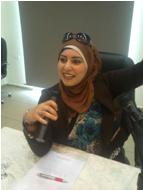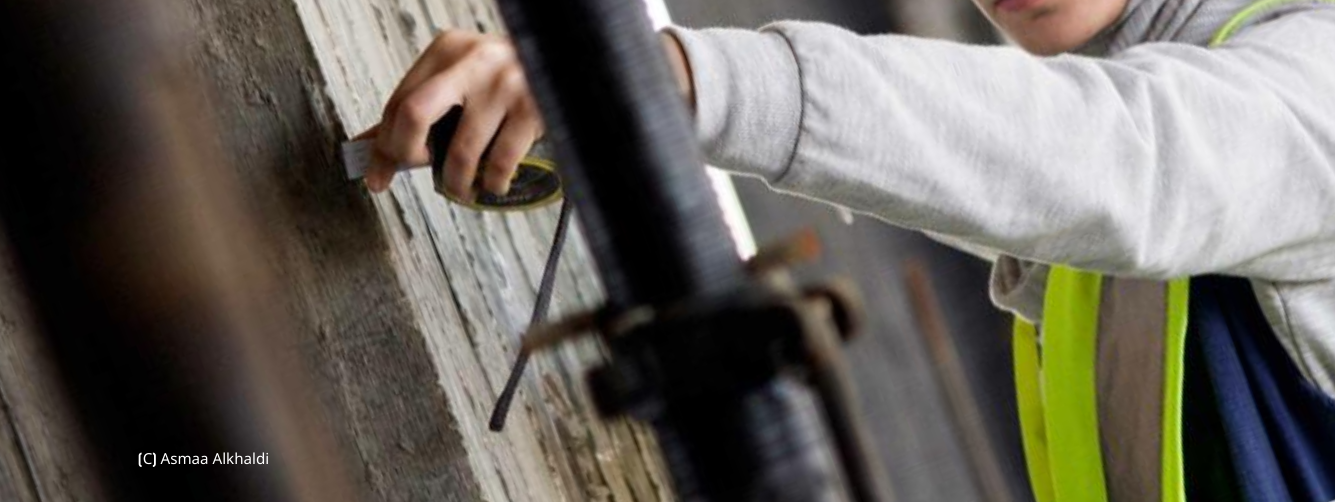
Dana Habaybeh: “MIFTAH armed us with knowledge and knowledge is the best form of support for anyone”
Dana Habaybeh 28, is a member of the local council in the village of Sanour and is a participant in the “Election support program” project. In spite of her early marriage, Habaybeh did not let anything hold her back from getting her university degree and becoming involved in the community activities in her village.
MIFTAH’s program seeks to empower leadership components in society through participation to promote democracy and good governance and to raise social awareness towards citizens’ rights and duties.
Habaybeh spoke a bit about herself, telling us that she got her BA in computer science from Al Quds Open University in 2010. Her community work started even earlier in 2003 when she established the charitable women’s society of Sanour along with Hajja Khayriyeh Habayba. “I am the vice president of the Society now,” she says, explaining that the association aims to enable women from economic, social and other aspects. It also provides care for the elderly through offering them medical services. The Society also has a section for carrying for people with special needs. “In Sanour, there are over 100 disabled people, which is a very high percentage for a population of 5,000,” she says, attributing this to the high rate of intermarriages between relatives. “Among other services, we were able to issue ID cards for them,” Habaybeh maintains.
So, how did Dana Haybebeh get involved with MIFTAH?
She says it was through the “Election support program” and the Jenin coordinator Farha Abu Hayja’. She involved a number of Sanour’s women in local elections, including Habaybeh because of her community work. “I wanted to participate so I could serve my village and its people and make it a better place,” Habaybeh says, adding that Farha had them take part in training courses for women candidates for local councils and supported them before and after the elections.
How did the training courses you received from MIFTAH for women candidates reflect on your work in the local council?
“The training I received from courses organized by MIFTAH have given me fundamental support because they were basically focused on the laws of local councils and women’s rights in the law,” Habaybeh explains. “Understanding the law is basic support for any person. Sound work comes from knowing and understanding the law.” She goes on to say that, “These courses boosted our confidence in ourselves and eliminated the fear of failure because our journey and efforts to get to this stage is a success in and of itself.”
Habaybeh also said being connected with MIFTAH has opened up new opportunities in work and has allowed her to expand her relationships with other community-based organizations in other cities after initially only being familiar with Sanur and Jenin.
What prompted you to participate in the elections? And how did others around you respond to your candidacy?
I wanted to do this because I wanted to serve my town so it could be a better place for my children. I believed the services being offered before were just not enough. I knew I had the ability to improve and develop on them and this has been what I wanted to do since I was a girl.
As for people’s responses, some were very encouraging and supportive, especially those who know me well, including my husband and kids. Others however, were more discouraging telling me things like: “Why give yourself a headache?” and “Your home and children are more important.” “But I knew in the long run that it would be worth it,” she maintains.
Habaybeh says most of the local council members support her and are proud of her work. “I even bought a mosquito sprayer instead of renting one each year,” she maintains. Some, unfortunately, have tried to push her out or undermine her role, which Habaybeh attributes to the patriarchal mentality in Palestinian society which does not accept a strong woman. “They only see women as homemakers, not as human beings with full rights,” she says. That is why she says training courses that aim to empower women should also target the community as a whole in order to change this culture and perception of women.
So, how did you deal with this opposition to your rising status?
“I armed myself with law and knowledge,” she says. “The truth is, I used to shy away from opposing anyone or filing an official complaint against this or that person. But this has all changed. Knowledge empowers a person and arms them with courage.” Still, she says the pressure got so much she handed in her resignation because of it. “Seven members resigned in solidarity with me, which put pressure on the council,” she says. “They promised to make changes and so I rescinded my resignation.”
How would you evaluate MIFATH’s work in empowering and supporting women? And what would you say to other women based on your experience?
“First of all, let me thank MIFTAH for its important role and for standing by us before and after the elections. It continued supporting us by giving us courses and training which changed how we perceive the role of women and their status in the law. I truly hope this support continues.
I would like to tell women, especially here in Palestine, that the role of women in their homes is a fundamental and important role. However, it does not hinder their role in their community. Women should make their voices heard. “We can face and overcome obstacles together; there are always bumps in the road on the way to success.”






